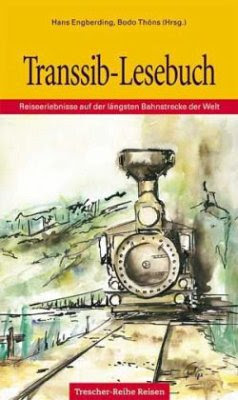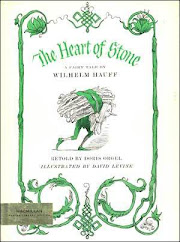Engberding, Hans; Thöns, Bodo (Ed.) "Transsib-Lesebuch: Reiseerlebnisse auf der längsten Bahnstrecke der Welt" [Transsib Reader: Travel Experiences On The Longest Railway Line In The World] - 2002Usually, I don't review books that have not been translated into English. But I promised to do so in this case. And some of the articles have been written in English. Whenever I found the original title (or the translation into English), I added it in bold.
I found this collection at an antiquarian bookstore. It contains articles, excerpts from books, short stories by well-known writers who have all at some point traveled the Trans-Siberian Railway and recorded their experiences in writing. The first description is from 1901, the last from 2001, i.e. a report that goes back over a hundred years in which a lot has happened.
The authors all have an interesting point of view, everyone experiences the trip differently, even if they travel around the same time. While some accept any inconvenience as if it were the most natural thing in the world and are happy to be able to gain this insight into a culture that is foreign to them, others get upset about small things that would probably have happened to them on other routes, as well. And then there are those who support communism (or rather Stalinism) a hundred percent that everything is glorified.
In any case, it is fascinating to see how the railway was built, how it has changed over time, especially when the political situation has changed.John Foster Fraser, Sir, UK, 1868-1936
Das wahre Sibirien (1901)
The Real SiberiaEugen Zabel, D, 1851-1925
Auf der sibirischen Bahn nach China (1903)
Karl Tanera, D, 1849-1904
Zur Kriegszeit auf der sibirischen Bahn und durch Rußland (1904)
O.T. Tuck, UK, 1876-?
Tagebuch (1909)
Marcus Lorenzo Taft, US,
Fremdes Sibirien (1909)
Fridtjof Nansen, N, 1861-1930 -
Nobel Prize for Peace 1922
Sibirien ein Zukunftsland (1913)
Through Siberia the Land of the Future/Gjennem Sibirien
Otto Goebel, D, 1872-1955
Über Sibirien nach Ostasien (1914)
Sven Hedin, S, 1865-1952
Von Peking nach Moskau (1923)
Richard Tröger, D, 1879-1965
Tagebuch über eine Rußland-Japan-Reise (1929)
Kurt Faber, D, 1883-1929
Weltwanderers letzte Fahrten und Abenteuer (1930)
Peter Fleming, UK, 1907-74 (Ian Fleming's brother)
Mit mir allein. Eine Reise nach China (1933)
One's Company: A Journey to China in 1933Erik Bergengren, S, 1900-1977
Gelbe Gesichter. Sibirische Nächte und japanische Tage (1936)
Mildred Widmer Marshall, US
Zwei Schullehrerinnen aus Oregon reisen um die Welt (1937)
Sławomir Rawicz, PL/BY, 1915-2004
Flucht durch Steppe und Wüste (1939)
The Long Walk?Sigrid Undset, DK, 1882-1949 -
Nobel Prize for Literature 1928
Wieder in die Zukunft (1940)
Back to the future/Tilbake til fremtiden
Ryszard Kapuscinski, PL/BY, 1932-2007
Imperium. Sowjetische Streifzüge (1958)
ImperiumSiegfried Meissgeier, D, 1924-1988 and Günter Linde, D, 1925-1992
Sibirien ohne Geheimnisse (1959)
Paul Theroux, USA, 1922-
Abenteuer Eisenbahn. Auf Schienen um die halbe Welt (1965)
The Great Railway Bazaar
Hugo Portisch, SLK, 1927-2021
So sah ich Sibirien (1966)
Vittorio Lojacono, I
Die Straße der Gefahr (1969)
Eric Newby, UK, 1919-2006
Auf der großen roten Bahn (1977)
The Big Red Train RideHans-Otto Meissner, D/F, 1909-1992
Sibirien-Expreß (1979)
Wolfgang Seidl, D, 1933-
Ins rote Reich des gelben Drachens (1984)
Hardy Krüger, D, 1928-2022
Sibirienfahrt (1984)
Johanna Hornef-Blau
Unterwegs mit der Transsibirischen Eisenbahn (1994)
Colin Thubron, UK, 1939-
Sibirien. Schlafende Erde - Erwachendes Land (1998)
In SiberiaKurt Drawert, D, 1956-
Nach Osten ans Ende der Welt (1999)
Mark Bauch, D 1971-
Transsibirisch Reisen (2001)
Das wahre Sibirien (1901)
Pictures by Claudia Mathea (D, 1969-) complement the stories.Book Description (translation):
"
The Trans-Siberian Railway has fascinated travelers from all over the world for a century now. This beautifully designed reader brings together prominent and less prominent Trans-Siberian travelers from all decades of the 20th century, who report on their journey on what is probably the world's most famous railway line.
Lively descriptions of the day-to-day organization of life on the Trans-Siberian Railway, the events on the train and the experiences with fellow travelers stand alongside historical observations from the checkered history of Russia, Mongolia and China. This creates a diverse picture of the countries traveled through.
Sven Hedin, Fridtjof Nansen, Hardy Krüger, Paul Theroux, Sigrid Undset, Peter Fleming and many others take the reader on an adventurous journey through the Siberian expanse. The Transsib Reader is the ideal complement to the Transsib Handbook."



























